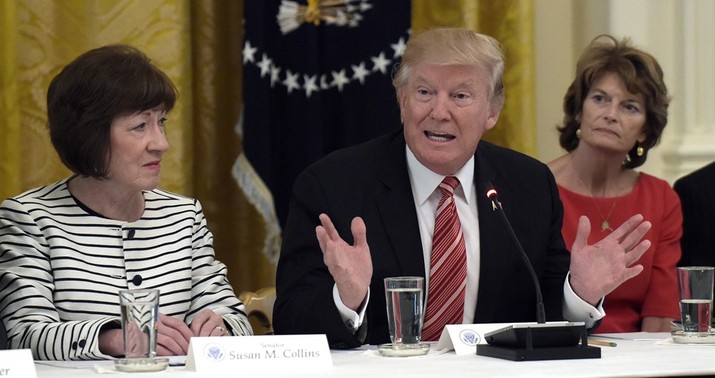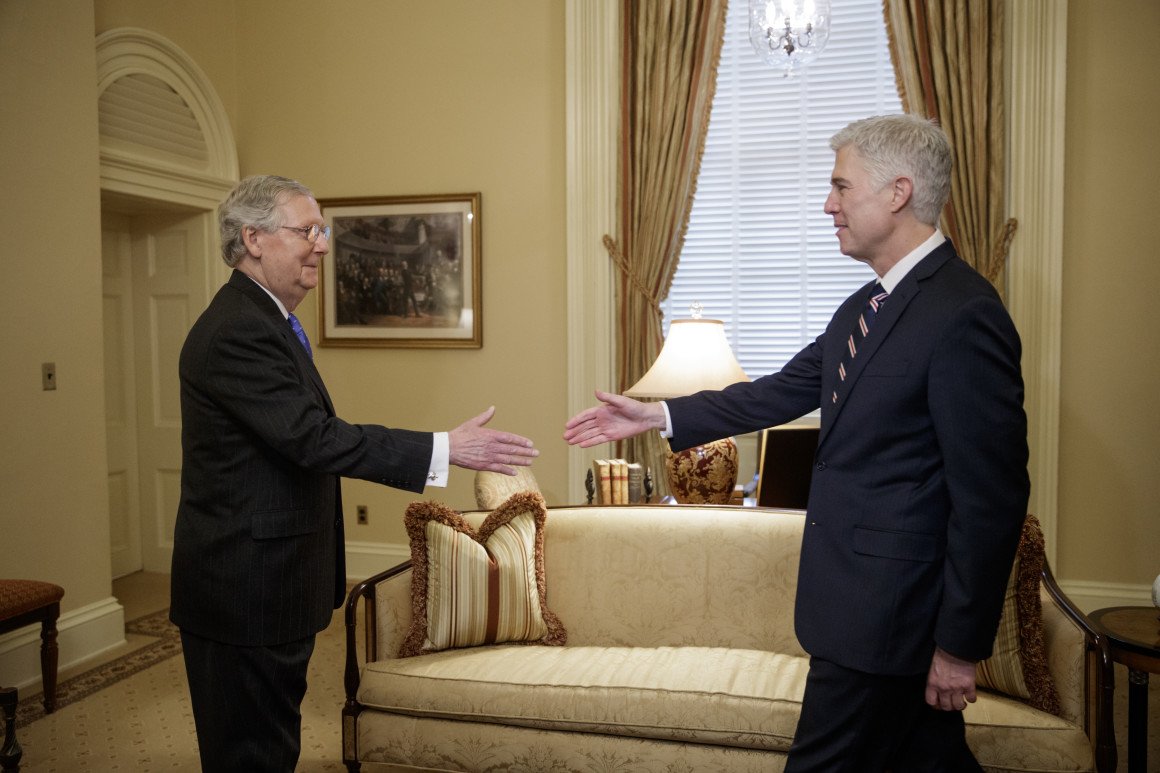And who knows — they may be right. While the Left melts down at the retirement of centrist Justice Anthony Kennedy, the path to confirming a conservative activist to the court looks much more fraught than people might think. Thanks to the GOP’s threadbare control of the Senate, it might be tough to round up 51 votes for a bold shift to the Right.
At least, that’s what Democrats are hoping, according to NBC:
Within hours of Wednesday’s surprising retirement announcement from Supreme Court Justice Anthony Kennedy, two moderate Republican women in the Senate became an important focus of Democrats seeking to prevent President Donald Trump from appointing a new justice who could reshape the court for decades to come — or at least temper how far right it might bend.
With little power to defeat a nominee outright on their own, Democrats began to look at Sens. Susan Collins, R-Maine, and Lisa Murkowski, R-Alaska, as potential allies in their cause.
Both are moderates who support abortion rights and they are likely to face growing pressure should Trump put forward a conservative nominee who might threaten to severely curb those rights. Senate Democrats are happy to lead that charge.
Let’s not forget that Collins and Murkowski torpedoed an ObamaCare repeal bill in part because it defunded Planned Parenthood, although John McCain performed the coup de grace on it. They’re not going to easily cast a vote for a fifth vote against Roe on the Supreme Court, at least not for an explicitly anti-abortion candidate like Amy Coney Barrett, no matter how qualified for the job they think she is.
However, they’re not going to jump into obstructionism just for the sake of obstructionism and Chuck Schumer either. Both voted for Neil Gorsuch, remember, despite his clear pro-life point of view; Collins acted as his sherpa in Senate hearings, and Murkowski publicly warned Schumer that she’d back Mitch McConnell’s nuclear play to get him confirmed. (So did McCain, for that matter.) Maybe they’d play it differently when it comes to replacing Kennedy and the all-important center square, but they’re not going to go that far off the reservation. If Trump nominates someone with at least a little plausible openness to Roe, they’ll vote to confirm.
So are those two the Democrats’ only hope? No — there is another. Well, two others, maybe:
Corker and Flake can preserve constitutional norms and free trade by announcing they won’t support Trump judicial nominees until:
1. A law is passed that kills Trump’s punitive tariffs, and,
2. Constitutional legislation is passed to protect Robert Mueller’s investigation .— Joe Scarborough (@JoeNBC) June 27, 2018
Corker and Flake are more of a risk for Trump, thanks to the open hostility between the three of them. Corker and Flake are both retiring at the end of the year too, so they’re not going to worry too much about the consequences of torpedoing a Trump nomination. Flake has already said he’d use his seat on Judiciary to spike Trump’s judicial nominations until Congress passes a bill taking control of US tariff policy. McConnell only has 51 votes in his caucus, and McCain’s not likely to be able to cast a vote; losing two Republicans, or potentially four, would be a disaster.
However, this seems unlikely to come to pass, too. It’s one thing to obstruct some district court nominations, but another entirely to block a Supreme Court nomination that might reset the court on a conservative path for the next generation. Corker seems particularly unlikely to obstruct that outcome, but Flake might think twice about it too, especially if the nominee is another Gorsuch. He can fight the tariff battle another day — the Supreme Court is a rare opportunity for conservatives. In the end, he’ll reluctantly come along for the simple reason that another conservative on the court is a win in the long run for Flake’s agenda, more so than Trump’s.
This does, however, point out why Allahpundit’s analysis of Chuck Schumer’s strategic failure on the nuclear option was so spot-on. Schumer filibustered Gorsuch at the start of the Trump presidency, when McConnell had 52 Republicans and Trump hadn’t alienated any of them. Had Schumer let Gorsuch through and saved the filibuster for now, would Flake still have voted for the nuclear option? Corker? Would Murkowski have ended it to replace Kennedy with a hardline conservative? With the loss of the seat in Alabama and McCain’s absence, McConnell would almost certainly have come up short, and Schumer could then force Trump to bargain on the nominee.
Now he’s got no leverage at all, and the best for which Schumer can hope is that a few Republicans will pull his chestnuts out of the fire. It’s not impossible, but the odds are a lot smaller than some might hope.

